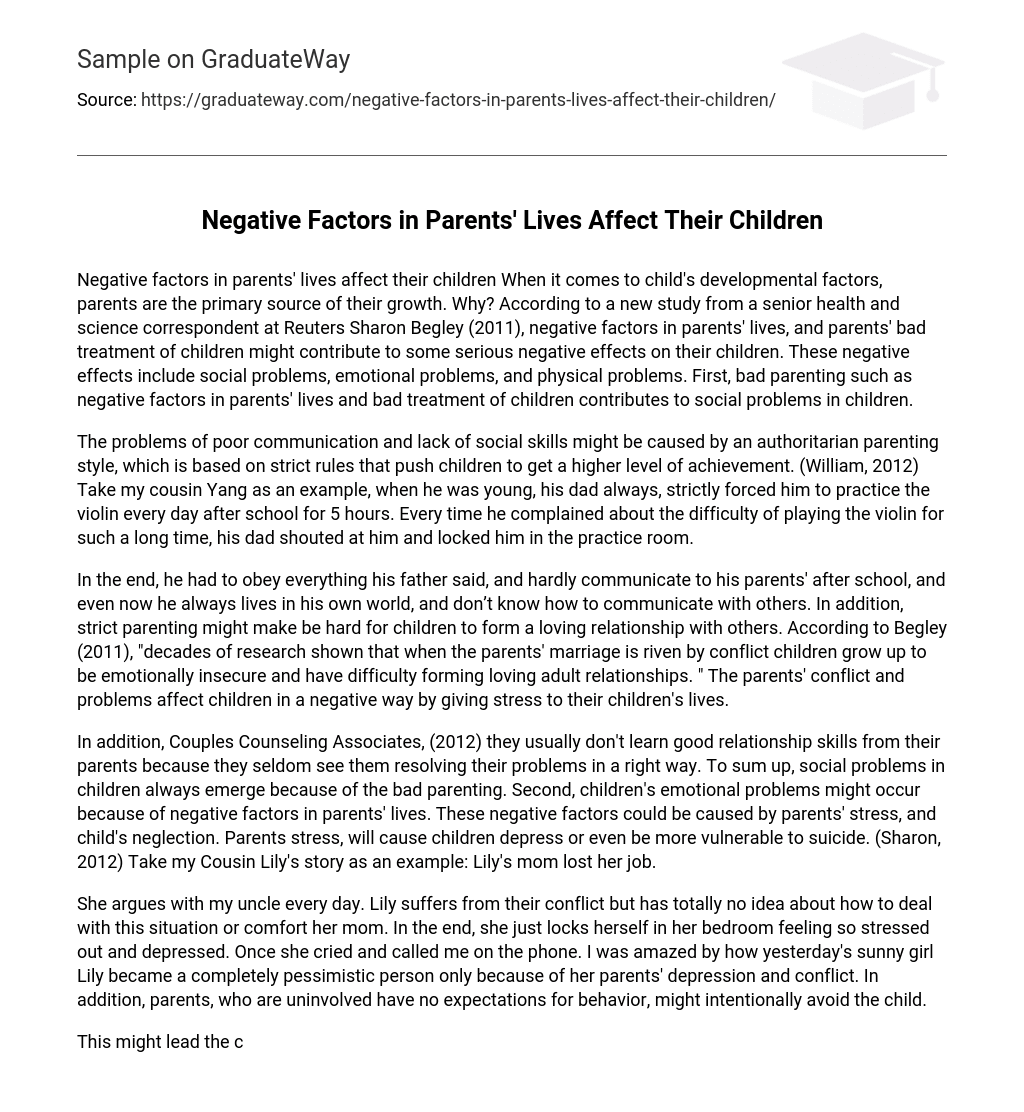Negative factors in parents’ lives affect their children When it comes to child’s developmental factors, parents are the primary source of their growth. Why? According to a new study from a senior health and science correspondent at Reuters Sharon Begley (2011), negative factors in parents’ lives, and parents’ bad treatment of children might contribute to some serious negative effects on their children. These negative effects include social problems, emotional problems, and physical problems. First, bad parenting such as negative factors in parents’ lives and bad treatment of children contributes to social problems in children.
The problems of poor communication and lack of social skills might be caused by an authoritarian parenting style, which is based on strict rules that push children to get a higher level of achievement. (William, 2012) Take my cousin Yang as an example, when he was young, his dad always, strictly forced him to practice the violin every day after school for 5 hours. Every time he complained about the difficulty of playing the violin for such a long time, his dad shouted at him and locked him in the practice room.
In the end, he had to obey everything his father said, and hardly communicate to his parents’ after school, and even now he always lives in his own world, and don’t know how to communicate with others. In addition, strict parenting might make be hard for children to form a loving relationship with others. According to Begley (2011), “decades of research shown that when the parents’ marriage is riven by conflict children grow up to be emotionally insecure and have difficulty forming loving adult relationships. ” The parents’ conflict and problems affect children in a negative way by giving stress to their children’s lives.
In addition, Couples Counseling Associates, (2012) they usually don’t learn good relationship skills from their parents because they seldom see them resolving their problems in a right way. To sum up, social problems in children always emerge because of the bad parenting. Second, children’s emotional problems might occur because of negative factors in parents’ lives. These negative factors could be caused by parents’ stress, and child’s neglection. Parents stress, will cause children depress or even be more vulnerable to suicide. (Sharon, 2012) Take my Cousin Lily’s story as an example: Lily’s mom lost her job.
She argues with my uncle every day. Lily suffers from their conflict but has totally no idea about how to deal with this situation or comfort her mom. In the end, she just locks herself in her bedroom feeling so stressed out and depressed. Once she cried and called me on the phone. I was amazed by how yesterday’s sunny girl Lily became a completely pessimistic person only because of her parents’ depression and conflict. In addition, parents, who are uninvolved have no expectations for behavior, might intentionally avoid the child.
This might lead the children to have an emotional problem, such as feel unimportant, have low self-esteem, be aggressive and have other behavioral problems because of lacking parenting, these children often defiant to authority figures, their school performance is usually poor and they always lack social skills. Additionally, they often struggle with drug and alcohol abuse. (Williams, 2012). Last but not least, children’s DNA might have an effect because of their parents depress and tension. Marilyn Essex (2011) said that mother’s depression, or a childhood abuse experience, would leave marks on children’s DNA.
For example, a woman has high stress during pregnancy, results in 139 genes being altered. Also, Dad’s stress might affect about 30 changes to his offspring’s genes, and dad’s emotionally and physically absence will cause their daughter to enter puberty earlier Begley (2011). According to what I learned from my biology class, when the parents fight at home, children get negative emotions, thus, the stress hormone releases in children’s brain, and the receptors on the children’s brain cells will be reduced which may restrain the children’s normal emotional expression.
This results in bluntness and slowness of the children’s behavior. Thus, the children might lack ability to respond, learn or be successful in the future. (Minka, 2006) In conclusion, negative factors in parents’ life create a social, mental and physical impact on their children. This serious issue should get more attention and care from our society. I hope every parent can try their best to provide a good environment for their children. I hope every child can grow up happily and healthily. Reference: 1. Begley,S (2011). How Stressed Parents Scar Their Kids.
Retrieved from: http://www. thedailybeast. com/articles/2011/09/12/parents-depression-and-stress-leaves-lasting-mark-on-children-s-dna. html 2. Couples Counseling Associates, (2012), Children in high conflict situations don’t learn good relationship skills, retrieved from: http://www. couples-counseling-now. com/marriage_problems. html 3. Minka, P (2006). Biology (International baccalaureate), p. g. 107. 4. Williams, (2012). the 4 Types of Parenting Styles, Retrieved from: http://lqwilliams2. hubpages. com/hub/The-3-Types-of-Parenting-Styles





